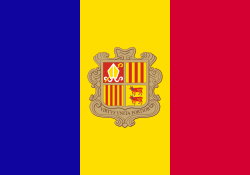Wikijunior Europe: Andorra

Andorra is a tiny country in south western Europe, located in the eastern Pyrenees mountains and bordered by Spain and France. Once isolated, it is currently a prosperous country mainly because of tourism and its status as a tax haven. The people of Andorra are currently listed as having the highest human life expectancies on Earth, at 83.52 years (2007 est). Andorra is 466 km2 and their capital city is Andorra la Vella. Andorra is not part of the European Union but it uses the Euro as its currency.
Andorra's History
[edit | edit source]Tradition holds that Charles the Great (Charlemagne) granted a charter to Andorran people in return for their fighting the Moors. Overlordship of the territory passed to the local count of Urgell and eventually to the bishop of the diocese of Urgell. In the eleventh century a dispute arose between the bishop and his northern neighbour over Andorra.
The conflict was resolved in 1278 by the signing of a paréage, which provided that Andorra's sovereignty be shared between the count of Foix (whose title would ultimately transfer to the French head of state) and the bishop of La Seu d'Urgell, in Catalonia, Spain. This gave the small principality its territory and political form.
Andorra was briefly annexed to Aragon twice, in 1396 and 1512.

Over the years the title passed to the kings of Navarre. After Henry of Navarre became King Henry IV of France, he issued an edict (1607) that established the head of the French state and the Bishop of Urgell as co-princes of Andorra.

Annex — If a country is annexed it means that it becomes part of another country, usually against the will of the people
In the period 1812–13, the First French Empire annexed Catalonia and divided it in four départements. Andorra was also annexed and made part of the district of Puigcerdà (département of Sègre).
Andorra declared war on Imperial Germany during World War I but did not actually take part in the fighting. It remained in an official state of belligerency until 1957 as it was not included in the Versailles Peace Treaty.
In 1933 France occupied Andorra as a result of social unrest before elections. On July 12, 1934, an adventurer named Boris Skossyreff issued a proclamation in Urgell, declaring himself Boris I, sovereign prince of Andorra, simultaneously declaring war on the bishop of Urgell. He was arrested by Spanish authorities on July 20 and ultimately expelled from Spain. From 1936 to 1940, a French detachment was garrisoned in Andorra to prevent influences of the Spanish Civil War and Franco's Spain. Francoist troops reached the Andorran border in the later stages of the war.
During World War II, Andorra remained neutral and was an important smuggling route between Vichy France and Spain.
Given its relative isolation, Andorra has existed outside the mainstream of European history, with few ties to countries other than France and Spain. In recent times, however, its thriving tourist industry along with developments in transportation and communications have removed the country from its isolation. Its political system was thoroughly modernized in 1993, the year in which it became a member of the United Nations.
Andorra's Geography
[edit | edit source]Andorra is in the Pyrenees mountain range. Andorra consists predominantly of rugged mountains of an average height of 1996 meters with the highest being the Coma Pedrosa at 2946 meters. These are dissected by three narrow valleys in a V shape that combine into one as the main stream, the Valira river, leaves the country for Spain (at Andorra's lowest point of 870 m). The Andorra surface is 468 km².
Andorra's climate is similar to its neighbors' temperate climates, but its higher altitude means there is on average more snow in winter and it is slightly cooler in summer.
Andorra's People
[edit | edit source]In Andorra there are about 85,000 people. The majority of the inhabitants of Andorra are foreign nationals, only 33% are actual Andorrans. The others are almost entirely from Spain and France. Even so, the only official language is Catalan, a language spoken in the north of Spain, and, like Spanish and French, is of Latin Origin.
Andorra's long history has provided it with a rich folklore and an abundance of folk tales, with roots originating as far as Andalusia in the south and the Netherlands in the north. Today the majority of people in Andorra are Christian, mostly Roman Catholic.
Andorran culture is Catalan in essence. It has given a significant and easily identifiable contribution to the conglomerate of Catalan culture.
Two writers renowned in Catalonia and the region, Michèle Gazier and Ramon Villeró, both come from Andorra.
Andorra is home to folk dances like the contrapàs and marratxa, which survive in Sant Julià de Lòria especially. Andorran folk music has similarities to all of its neighbors, but is especially Catalan in character, especially in the presence of dances like the sardana. Other Andorran folk dances include contrapàs in Andorra la Vella and Saint Anne's dance in Escaldes-Engordany.
Andorra's Sights
[edit | edit source]Andorra is popular with tourists who visit during the winter for skiing holidays and all-year-round for shopping trips - popular because of the price and tax differences between Andorra and neighbouring Spain and France.
Andorra has one UNESCO World Heritage Site: Madriu-Claror-Perafita Valley.
| Wikijunior Europe • Intro • EU • Geo • People • Language • Facts • Quiz | edit | ||
